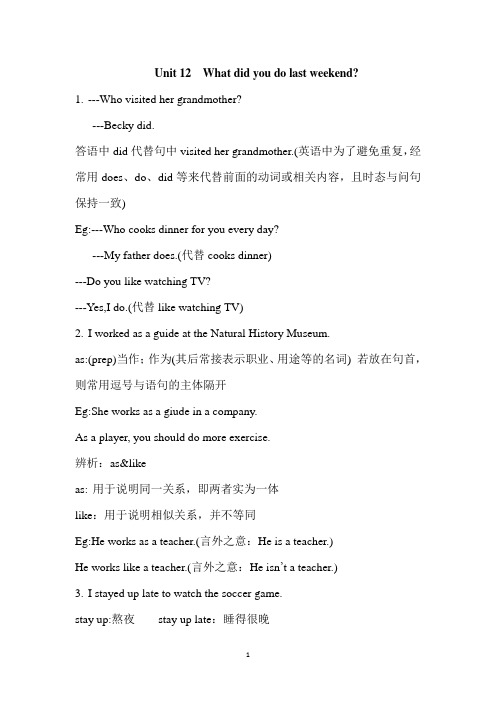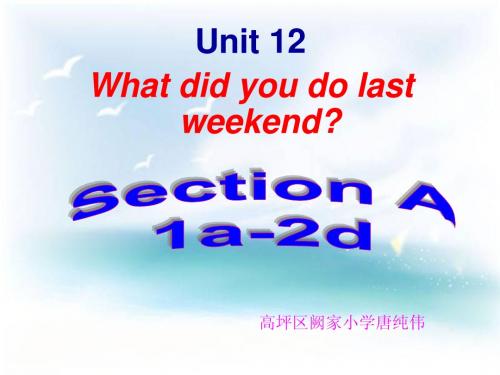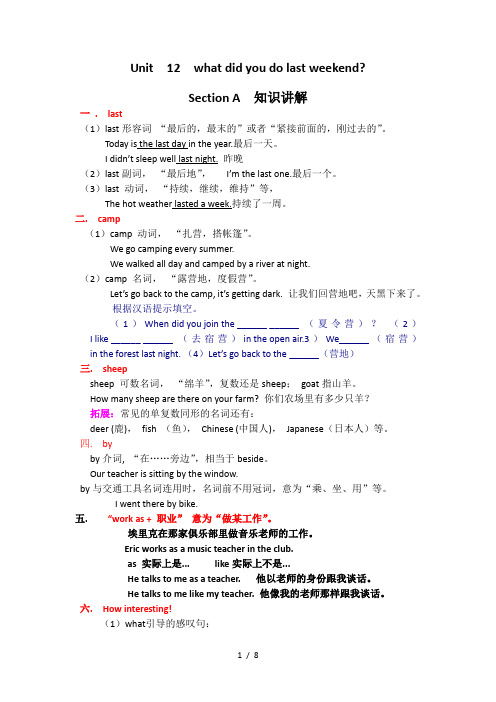七年级英语下册Unit12Whatdidyoudolastweekend短语语法知识点汇总新版人教新目标版
- 格式:doc
- 大小:65.50 KB
- 文档页数:7

Unit 12 What did you do last weekend?1.---Who visited her grandmother?---Becky did.答语中did代替句中visited her grandmother.(英语中为了避免重复,经常用does、do、did等来代替前面的动词或相关内容,且时态与问句保持一致)Eg:---Who cooks dinner for you every day?---My father does.(代替cooks dinner)---Do you like watching TV?---Yes,I do.(代替like watching TV)2.I worked as a guide at the Natural History Museum.as:(prep)当作;作为(其后常接表示职业、用途等的名词) 若放在句首,则常用逗号与语句的主体隔开Eg:She works as a giude in a company.As a player, you should do more exercise.辨析:as&likeas: 用于说明同一关系,即两者实为一体like:用于说明相似关系,并不等同Eg:He works as a teacher.(言外之意:He is a teacher.)He works like a teacher.(言外之意:He isn’t a teacher.)3.I stayed up late to watch the soccer game.stay up:熬夜stay up late:睡得很晚与stay相关的常见短语:stay at home待在家里stay away from远离stay healthy保持健康stay out 待在外面与up相关的短语call up 打电话catch up with 赶上come up with提出get up 起床give up放弃grow up 成长look up 向上看;查出make up编造;构成pick up 捡起;中途载人put up 举起;张贴set up 创建show up出现take up 占据turn up调大use up用完;耗尽4.Father mouse shouted at the cat, “Woof,woof.”辨析:shout at &shout toShout at:冲...大声叫喊(多指因生气/愤怒冲某人叫喊)Eg: He loses his temper and shouts at me.shout to:对...大声叫喊(无恶意,多因距离远)Eg: : “Can you hear me?”he shouts to Tom.5.“Well,son,that’s why it’s important to learn a second language.”(1)that’s why...这就是...的原因why引导的名词性从句在句中作表语Eg:That’s why I can pass the important exam,because I study hard. that’s because...那是因为...(表示原因)Eg:He didn’t go to school trip. That’s because he was badly ill.6.flew a kite 放风筝flew为fly的过去式fly的用法:(vi)(1)fly to乘/坐飞机=go (to)...by plane/airEg:She will fly to New York. She will go to New York by plane/air.(2)飞Eg:He hopes he can fly like a bird.(3)飞逝Eg:How time flies! (时光飞逝)(4)苍蝇Eg:Look! A fly is swimming in the porridge.7.There we put up our tents and made a fire to keep us warm and cook food on.(1)put up:搭建;张贴(动副结构)(2)keep的用法Keep sb./sth.+adj 让某人/某物保持...(强调某种状态)Eg:The coat will keep you warm.The students should keep the classroom clean.Keep sb./sth.+doing 让某人/某物一直...(强调动作的持续性)Eg:I’m sorry I’ve kept you waiting.8.The next morning,my sister and I got a terrible surprise.get a surprise 吃惊(可数名词)surprise:(不可数名词)in surprise惊奇地;惊讶地To one’s surprise 令某人惊讶的是(vt)使吃惊;使惊奇(adj)surprising surprisedEg:Her idea surprises me.9.I was so scared that I couldn’t move.(1)so...that...如此...以致于... (so后接adj/adv)Eg:The box is so heavy that I can’t carry it.He runs so fast that I can’t catch up with him.拓展:such+a/an+adj+单数可数名词+that...相当于so+adj+a/an +单数可数名词+that...Eg:Mr. Yi is such a kind teacher that we all like him. Mr. Yi is so kind a teacher that we all like him.(2)scared:惊慌的;吓坏了的=afraidbe scared of sth. 害怕做某事be scared to do sth.害怕做某事Eg:Miss Zhang is scared/afraid of the ghost.The little boy is scared/afraid to read in fornt of the others.10.感叹句(what/how )。


最新人教版七年级英语下册单元知识归纳Unit12Unit 12 What did you do last weekend?重点清单1.do one's homework 做家庭作业2.go to the cinema 去看电影3.go boating 去划船4.camp by the lake 在湖边露营5.go to the beach 去海边6.play badminton 打羽毛球7.living habits 生活习惯8.have a good weekend 度一个好周末9.stay up 熬夜10.two weeks ago 两个星期前11.go camping 去露营12.put up 穿(戴)上13 make a fire 生火14.each other 相互15.get a surprise 吃惊16.look out of 朝外看17.shout to ... 对 ... 大喊18.start to do sth. 开始做某事19.up and down 到处20.wake ... up 叫醒 .......21.1stayed up late to watch the soccer game・我熬夜看足球比赛。
22.1worked as a guide at the Natural History Museum.我在自然历史博物馆当导游。
23.They have a butterfly house with over 200kinds of butterflies.他们有一个蝴蝶屋,里面有200多种蝴蝶。
24.There we put up our tents and made a fire to keep us warm and cook food on.在那我们支起一个帐篷,并生火取暖,在火上烹饪食物。
25.1was so tired that I went to sleep early.我太累了,因此很早就去睡觉了。

Unit 12 what did you do last weekend?Section A 知识讲解一. last(1)last形容词“最后的,最末的”或者“紧接前面的,刚过去的”。
Today is the last day in the year.最后一天。
I didn’t sleep well last night. 昨晚(2)last副词,“最后地”,I’m the last one.最后一个。
(3)last 动词,“持续,继续,维持”等,The hot weather lasted a week.持续了一周。
二. camp(1)camp 动词,“扎营,搭帐篷”。
We go camping every summer.We walked all day and camped by a river at night.(2)camp 名词,“露营地,度假营”。
Let’s go back to the camp, it’s getting dark. 让我们回营地吧,天黑下来了。
根据汉语提示填空。
(1)When did you join the ______ ______ (夏令营)?(2)I like ______ ______ (去宿营)in the open air.3)We______(宿营)in the forest last night. (4)Let’s go back to the ______(营地)三. sheepsheep 可数名词,“绵羊”,复数还是sheep;goat指山羊。
How many sheep are there on your farm? 你们农场里有多少只羊?拓展:常见的单复数同形的名词还有:deer (鹿),fish (鱼),Chinese (中国人),Japanese(日本人)等。
四. byby介词, “在……旁边”,相当于beside。
Our teacher is sitting by the window.by与交通工具名词连用时,名词前不用冠词,意为“乘、坐、用”等。

Unit 12 What did you do last weekend?【短语归纳】1.do my homework 做作业2.go to the cinema 去看电影3.go boating 去划船4.by the lake 在湖边5.go to the beach 去海滩6.play badminton 打羽毛球7.visit my grandma 看望我奶奶8.study for the English test 为英语测验而学习备考9.the Natural History Museum 自然历史博物馆10. kind of 有点儿11.stay up 深夜不睡,熬夜12. give back 归还13.be afraid 害怕14. play the guitar 弹吉他15.go to the library 去图书馆16. in a swimming pool 在游泳池里17. shout at… 冲……大声叫嚷18. high school 高中,中学19.fly kites 放风筝、20. go camping 去野营21.put up 搭建22 .make a fire 生火23.tell stories 讲故事24 .each other 互相25.go to sleep 入睡26.get a surprise 吃惊27.shout to… 呼喊……喊叫…… 28.up and down 来来回回;上上下下29.wake…up 把……弄醒30.do my homework 做我的家庭作业31.on Saturday morning 在星期六早上32.have a good weekend 周末过得愉快33.the next morning 第二天早上34.work as 以……身份而工作35.run away 跑开36.move into … 移进……【用法集萃】1. go + doing 去做某事2. play + 球类玩……球3. 时间段+ ago ……前4. keep + sb. / sth. + 形容词/ 副词/ 介词短语使……保持……5. so + 形容词/ 副词+ that 句子如此……以至于……6. see sb. doing sth. 看见某人正在做某事7. let sb. do sth. 让某人做某事8. start to do / doing sth. 开始做某事【经典范文】I had a busy weekend. On Saturday morning, I did my homework, and then I played computer games. In the afternoon, I visited my grandmother. We talked for a long time.On Sunday morning, I cleaned my room and did some reading. Then I cooked for m parents. In the afternoon, I watched a football match on TV and listened to music. I had a good time.知识点解析1. 表示““过去”的时间。

Unit 12 What did you do last weekend?2012版人教新目标七年级英语下册课堂笔记1. camp v. 扎营;搭帐蓬Where did you camp last night?go camping去野营camp out野营;露营campn.营地;阵营2. lake n. 湖;湖泊There is no fish in this lake.on the lake在湖面上in the lake在湖里3. beach n. 海滩;沙滩They walked along the beach.复:beacheson the beach在海滩上4. sheep n. 绵羊;羊复:sheep There are 3 sheep eating grass under the tree.5. as prep.作为,当作as像……一样As a student, you should study hard.6. natural adj. 自然的My mother uses natural gas to cook meals.naturaladj.天生的7. visitor n. 游客;访问者近:touristn.旅游者;游客She is showing some visitors around our school.8. tired adj. 疲劳的;疲倦的He looks tired today.近:tiringadj.累人的be tired of对……厌烦tiredadj.厌烦的;厌倦的9. stay v. 停留;待Please stay at home.反:leavev.离开stay up熬夜stayn.停留;逗留v.保持10. away adv. 离开;远离People began to move away.run away跑开go away走开awayadv.在远处11. mouse n. 老鼠;耗子I saw 2 mice in the kitchen.复:micemousen.鼠标;胆上如鼠的人12. baby adj. 幼小的;婴儿The baby deer can stand up now.复:babies13. shout v. 呼叫;喊叫You shouldn’t shout at old people.shout at冲……大声叫嚷14. language n.语言They learn the language through songs and games.foreign language外语body language肢体语言mother language母语1. fly v. 飞The little bird still can’t fly.fly away飞走flyn.苍蝇2. kiteThat kite looks like a butterfly.fly a kite放风筝3. high adj. & adv. 高的(地)There is a high mountain at the back of the house.My kite can fly high in the sky.近:tall反:lowhigh school中学height高度4. ago adv. 以前He left here 3 days ago.近:beforelong time ago很久以前5. India n. 印度He lives in India with his mother.Indianadj.印度的,印度人6. tentPeople sleep in tents when they go camping.put up a tent搭帐篷tentv.住帐篷7. moon n. 月亮There is no water or air on the moon.full moon满月8. surprise n. 惊奇;惊讶v. 使吃惊He looked at me in surprise.The news surprised me.in surprise惊奇地to one’s surprise使某人吃惊的是get a surprise吃惊surprisedadj.感到惊讶的surprisingadj.令人惊讶的9. snake n. 蛇There is a snake in the grass.10. scared adj. 惊慌的; 吓坏了的。
人教版七年级下册英语Unit 12 知识点总结Unit 12 What did you do last weekend? 一、词汇与短语◆重点单词A部分1.camp 扎营;搭帐篷v.2.lake 湖;湖泊n.3.beach 海滩;沙滩n.4.badminton 羽毛球运动n. 5.sheep 羊;绵羊n.6.as 作为;当作prep. 7.natural 自然的adj.8.butterfly 蝴蝶n.9.visitor 游客;访问者n.10.tired 疲倦的;疲劳的adj. 11.stay 停留;待v.12.away 离开;远离adv. 13.mouse 老鼠;耗子n.14.baby 幼小的adj. 婴儿n. 15.shout 呼叫;喊叫v.16.language 语言n.B部分1.fly 飞v.2.India 印度n.3.kite 风筝n.4.tent 帐篷n.5.high 高的(地) adj.&adv.6.moon 月亮n.7.ago 以前adv.8.surprise 惊奇;惊讶n. 使吃惊v. 9.snake 蛇n.10.scared 惊慌的; 吓坏了的adj. 11.move 移动v.12.start 开始;着手v.13.jump 跳; 跃v.14.wake 弄醒;醒v.15.into 到……里面;进入prep.16.forest 森林n.17.ear 耳朵n.◆重点短语A部分1.stay up late深夜不睡;熬夜2.run away跑开3.shout at……冲……大声4.last weekend 上周末5.go boating 去划船6.camp by the lake 湖畔扎营7.one's living habits某人的生活习惯8.feed sheep 喂羊9.as a guide作为一名导游10.butterfly house 蝴蝶馆11.tell sb. about……告诉某人关于……12.go with sb. 和某人一起去13.have a good weekend 度过一个愉快的周末14.play badminton 打羽毛球B部分1.fly a kite 放风筝2.high school 中学3.put up 搭起;举起4.each other 互相;彼此5.get a surprise 吃惊6.shout to……对……大声喊叫7.up and down 上上下下;起伏8.wake……up 把……弄醒9.a special gift 一件特殊的礼物10.take a long bus ride to 乘长途车去11.put up 搭起;举起12.keep sb. warm 使某人暖和13.on the first night 在第一个夜晚14.tell a story 讲故事15.go to sleep 入睡,睡着16.look out of 朝外看17.read a book about…读关于…的书18.know about 知道关于19.start to do sth. 开始做某事20.jump up and down 跳上跳下21.move into 搬进22.make a fire 生火23.something interesting 有趣的事情24.feel……doing sth. 觉得……正在做某事25.finish high school 高中毕业26.see……doing sth. 看见……正在做某事27.clean one's room 打扫房间28.so……that……如此……以至于……29.on Saturday night 在周六晚上30.have dinner with sb.和某人一起吃晚饭31.stay at home 待在家里32.have a busy weekend度过一个繁忙的周末33.talk show 脱口秀34.study for……为……学习◆重点句子A部分1.—What did you do last weekend? 上个周末你做什么了?—I did my homework. 我做我的家庭作业了。
七下Unit 12 What did you do last weekend?一、Important Phrases:1.go to the cinema 去影院★=go to the movies2.go boating/camping 去划船/野营★summer camp 夏令营3.camp by the lake 在湖边野营★by the pool在池边4.go to the beach 去海滩★on the beach 在沙滩上5.play badminton 打羽毛球play+球类/棋类名词(不加冠词)6. study for the test 备考★test=exam7.feed some sheep/cows喂羊/牛★feed(fed)on...以..为食,feed with...用...喂养8. work as a guide 做导游工作★work as +职业从事某工作9. at the Natural History Museum 自然历史博物馆★nature(n.不可数)大自然-natural(adj.)自然的10. over 200 kinds of butterflies 200多种蝴蝶★over=more than 超过11.living habits 生活习惯★make a living 谋生;eating habits饮食习惯12.kind of tired 有点累★kind of = a little13. stay up late 熬夜★stay at home 待在家,stay away from 远离,lately(adv.)最近地14.sleep early 早睡★sleepy 困的,asleep睡着的15.a family of mice 老鼠一家★mouse(单)-mice(复)16.be afraid of sth./to do 害怕★afraid=scared17.run away 跑开★take away 带走,put...away 把某物收拾好,give away 捐赠18. climb onto one’s back 爬上某人的背19. shout at/to sb.冲某人大叫★shout out 大喊出20. a second language 第二语言★mother tongue 母语21.fly a kite放风筝22.do something interesting 做有趣的事★修饰不定代词,adj.后置:anything special23.finish high school 中学毕业★finish doing sth 完成做某事24.a special gift一特殊礼物★gift=present25.take us to India 带我们去印度26.take a long bus ride 坐很久的公交车27.put up our tents 搭帐篷★put up:搭建,举起,张贴28.make a fire生火29.cook food on the fire 在火上做饭★on an open fire 明火,篝火30.tell cach other stories 互相讲故事★tell a lie 说谎,tell a joke 讲笑话31.keep sb.warm 使某人保持暖和32.sit under the moon 坐在月光下★moonlight月光,moon cake月饼33.so.......that.......如此...以致于...34.get a surprise 吃惊35. look out of...向外看★look out 小心,look for寻找,look after 照顾36. jump up and down 跳上跳下37. move into the forest 进入森林38. wake sb up叫醒某人★wake up醒来,awake醒着的39. read a book about history 读一本历史书★read...to sb给某人读...40.see an interesting talk show 看有趣的脱口秀二、Key Language Points:1.Where did you go last weekend? What did you do last weekend?上周末你去了哪里?上周末你做了什么?一般过去时的特殊疑问句:1)特殊疑问词+did+主语+v.(原)+其他?如疑问词作主语,则陈述语序,如:Who bought you this new dress?谁给你买的新裙子?2)特殊疑问词+was/were+主语+其他?Where were you last night?昨晚你在哪里?2.----Who visited her grandma? -----Becky did.为避免重复,常用do,does,did,so等代替前文提到的内容。
Unit 12 What did you do last weekend?课文重难点讲解【教师寄语】:Where there’s a will,there’s a way. 有志者事竟成。
Section A1. What did you do last weekend, Lucy? 露西,你上周末做什么?【解析】 What +did + 动词原形 +其他?答语:主语+动词过去式+ 其他?— What did you buy last Monday?— I bought some apples.do/does →did v 做,行动【拓展】当“last/next/this/ that +时间词”在句中作状语时,其前通常不用介词He went to the cinema with his friends last Sunday.① I ______________(not do) my homework last night.( )②—Did you give Tom a phone call?— Yes , I did. But nobody _____.A. answerB. answeredC. answersD. answering2. Well, on Sunday morning, I played badminton.哦在星期天的早上,我打了羽毛球【解析1】on Sunday morning “在星期六上午”【注】:在具体的某一天,某一天的早上、下午、晚上用介词onon Sunday afternoon 在星期天下午on children’s Day 在儿童节那天on the afternoon of May 8 在三月八号的下午①— What did you do?— I _____________(play) the guitar.( ) ②We played tennis in the park ____ Tuesday.A. inB. onC. atD. for( )③ The accident happened ____ a cold winter early morning.A. inB. atC. onD. for【解析2】played badminton 打羽毛球Play +球类名词(球类名词前不加任何冠词)Play basketball 打篮球 play volleyball打排球 play tennis 打网球3. camped by the lake 在湖边野营【解析】camp v“扎营,搭帐篷” go camping 去野营— Would you like to go ______________(camp) with us this afternoon?— Yes, I’d love to4. I studied for the math test. 我为数学测验而学习。
Unit 12 What did you do last weekend?知识点整理Unit 12 What did you do last weekend?知识点整理一、重点短语1. play badminton 打羽毛球2. camp by the lake 在湖边野3. gbeach 去海滩4. ga 去电影院5. tell sb. about sth.告诉某人有关...的情况6. stay up 熬夜7. ovan超过;多余 8. fly a kite 放风筝9. run away 逃跑 10. second language 外语11. anythingg注:不定代词+形容词 12. shout to sb. 对某人大声喊叫13. that’s why+从句“那就是为什么......” 14. ta 带领某人去某处15. put u搭建帐篷 16. make a fire 生火us warm 使得我们暖和ght 在头一天夜里19. und在月光下 20. ea互相21. get a terrible surprise 大吃一惊 22. look out of 从......往外看23. know about 知道 24. start to do sth. 开始做某事25. up and down 上上下下 26. wake up 醒来 wake sb. up 叫醒某人27. mov移动进入 28. learned from 从......学到29. stay at home 呆在家里二.重点句型1. —What did you do last week? 你上个星期做了什么事?—I didwork. /We went boating 我做我的作业。
/我们去划船了。
2. —How was your weekend? 你上个星期过得怎样?—Great,thanks. 很好,谢谢。
3. I stayed up late to wagame. 我熬夜到很晚是为了看球赛。
Unit 12 What did you do last weekend一、基础归纳【教材内容解析】Section A1.camped by the lake (P. 67)camp此处用作动词,表示“扎营、搭帐篷”,常用的短语为:go camping“去野营”;camp out“野营、露营”。
Where did you camp last night?They often go camping during summer holidays.The students love camping out during summer holidays.2.I worked as a guide at the Natural History Museum. (P. 68)as此处用作介词,表示“作为、当作”,后接表示职业的名词。
He works as an actor. As a student, you should study hard.3.How interesting! (P. 68)how引导的感叹句的结构为“How+形容词/副词+主语+谓语”。
How beautiful the bird is! How fast Mary runs!【拓展】what引导的感叹句常用的结构有:“What+a/an+形容词+单数可数名词+主语+谓语”或者“What+形容词+可数名词复数/不可数名词+主语+谓语”。
What a beautiful flower! What interesting books these are! What heavy snow it is!4.I told the visitors about them and their living habits. (P. 68)tell sb. about sth.意为“告诉某人关于某事”。
Mary told me about her pet dog.5....but I’m kind of tired now. (P. 68)kind of表示“有点儿”,相当于a little。
She is kind of fat.6.I stayed up late to watch the soccer game. (P. 68)stay up意为“熬夜”,要表达“为……而熬夜”用stay up for sth.。
I stayed up late for my homework.7.A family of mice were in the kitchen on Saturday morning when they saw a big cat. (P. 69) family为集合名词,表示整体,指代家庭整体概念时,谓语动词用单数形式;表示个体,指代家庭成员时,谓语动词用复数形式。
The Green family are watching TV now. The Green family is a big one.8....that’s why it’s important to learn a second language. (P. 69)That’s why...意为“那就是为什么……”,表示结果。
That’s why I didn’t come. I got up late. That’s why I missed the bus.Section B1.flew a kite (P. 70)fly此处用作及物动词,意为“放飞”。
My father helped me to fly the model plane.2.Did you do anything interesting last weekend? (P. 70)形容词修饰不定代词时,放在不定代词后边。
This isn’t anything important.3.There we put up our tents and made a fire to keep us warm and cook food on. (P. 71)(1)put up此处表示“搭建起”,还可以表示“张贴、举起、建造”。
Please put up your hand if you have any question.You’d better put up a notice here.They put up many buildings last year.(2)make a fire意为“生火”。
He went back home and made a fire.4.On the first night, we just sat under the moon and told each other stories.each other意为“互相、彼此”,相当于one another,常用作宾语。
They helped each other. We talked to each other.5.But I was so tired that I went to sleep early. (P. 71)so...that...意为“如此……以至于……”,so是副词,后接形容词和副词,that引导结果状语从句。
He is so young that he can’t look after himself.The boy ran so fast that I couldn’t catch up with him.6.The next morning, my sister and I got a terrible surprise. (P. 71)the next morning表示“第二天早上”,以过去或者将来某个时间为起点的第二天早上;next morning表示“明天早上”,以现在为起点的第二天早上。
We started the next morning. We will visit him next morning.7.When we looked out of our tent, we saw a big snake sleeping near the fire.①look out“向外看”,若表示“向外看某物”用look out at sth. 若表示“向……外看”用look out of。
Don’t look out of the window in class.② look out还可以表示“小心”,“对……小心”用look out forLook out for the coming bus.8.I was so scared that I couldn’t move. (P. 71)scared用作形容词,表示“惊慌的、吓怕的”,常用的搭配为:be scared of害怕……;be scared to do sth.害怕做某事。
He was scared of snakes.The little girl is scared to cross the road.9.We shouted to our parents to let them know about the danger. (P. 71)shout to sb.意为“对某人大声叫喊”,shout at则表示“因为生气或者愤怒而大喊”。
We shouted to the driver, but he didn’t hear us.Don’t shout at me.10.My dad started to jump and down in their tent. (P. 71)start后常接名词、动词不定式或者动名词作宾语,用法相当于begin。
When shall we start the meeting?Let’s start discussing/to discuss about the next problem.11.This woke the snake up and it moved into the forest near the lake. (P. 71)① wake作不及物动词,表示“醒来”,常同up连用。
He usually wakes up early in the morning.② wake作及物动词,表示“喊醒、叫醒”,常同up连用。
The teacher woke up all the kids for class.12.What an interesting job they have! (P. 72)本句是what引导的感叹句,what引导的感叹句常用的结构有:“What+a/an+形容词+单数可数名词+主语+谓语”或者“What+形容词+可数名词复数/不可数名词+主语+谓语”。
What a beautiful flower!What interesting books these are!What heavy snow it is!【拓展】how引导的感叹句的结构为“How+形容词/副词+主语+谓语”。
How beautiful the bird is!How fast Mary runs!【语法讲解】一般过去时(II)1.一般过去时表示过去某个时间发生的动作或存在的状态,常和表示过去的时间状语连用。
一般过去时也表示过去经常或反复发生的动作。
2.Be动词在一般过去时中的变化:⑴am 和is在一般过去时中变为was。
(was not=wasn’t)⑵are在一般过去时中变为were。
(were not=weren’t)⑶带有was或were的句子,其否定、疑问的变化和is, am, are一样,即否定句在was或were后加not,一般疑问句把was或were放到句首。
3.句中没有be动词的一般过去时的句子否定句:didn’t +动词原形,如:Jim didn’t go home yesterday.一般疑问句:在句首加did,句子中的动词过去式变回原形。
如:Did Jim go home yesterday?特殊疑问句:⑴疑问词+did+主语+动词原形?如: What did Jim do yesterday?⑵疑问词当主语时:疑问词+动词过去式?如:Who went to home yesterday?动词过去式变化规则:1.一般在动词末尾加-ed,如:pull-pulled, cook-cooked2.结尾是e加d,如:taste-tasted3.末尾只有一个元音字母和一个辅音字母的重读闭音节,应双写末尾的辅音字母,再加-ed,如:stop-stopped4.以“辅音字母+y”结尾的,变y为i,再加-ed,如:study-studied5.不规则动词过去式:am,is-was are-were, do-did, see-saw, say-saidgive-gave, get- got, go-went, come-cam e, have-had,eat-ate, take-took, run-ran, sing-sang , put-put,make-made, read-read, write-wrote, draw-drew, drink-drank,fly-flew, ride-rode, speak-spoke, sweep-swept , buy-boughtswim-swam, sit-sat bring--brought can-could cut-cutbecome-became begin-began draw-drew feel-felt find-foundforget-forgot hear-heard keep-kept know-knewlearn-learnt (learned)leave-left let-let lose-lostmeet-met read-read sleep-slept speak-spok e take-tookteach-taught tell-told write-wrote wake-woke think-thought。